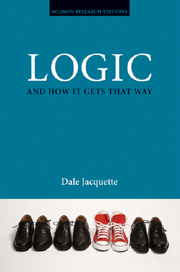Book contents
- Frontmatter
- Contents
- Preface
- Introduction: Logic, philosophy, analysis
- 1 Logical form
- 2 Monkey raisins
- 3 The secret life of truth-functions
- 4 Reference and identity
- 5 Intensional versus extensional logic and semantics
- 6 Truth
- 7 Logical and semantic paradoxes
- Conclusion: Moral lessons of logic
- Notes
- References
- Index
6 - Truth
- Frontmatter
- Contents
- Preface
- Introduction: Logic, philosophy, analysis
- 1 Logical form
- 2 Monkey raisins
- 3 The secret life of truth-functions
- 4 Reference and identity
- 5 Intensional versus extensional logic and semantics
- 6 Truth
- 7 Logical and semantic paradoxes
- Conclusion: Moral lessons of logic
- Notes
- References
- Index
Summary
WHAT IS TRUTH?
We will certainly not be the first to ask the difficult question “What is truth?” Often the query is posed by those who despair of any clear-cut answer or are cynical even about the possibility of understanding or ever arriving at the truth.
When that first postmodern deconstructionist Pontius Pilate cynically asked this of a Nazarene rebel in the Roman province of Judea under his jurisdiction (John 18:38), the problem of the constitutive nature of truth reasserted itself as a philosophical topic in Western consciousness from the time of its ancient Greek origins. The concept of truth is one of the most important, and one of the most elusive, in all of philosophy. By vocation, philosophers are driven by their love of knowledge to try to understand the nature of truth, in recognition of the long-standing analysis whereby knowledge implies truth. Even those who believe that there is no such thing as truth, or that we can never arrive or know with certainty that we have arrived at the truth, are collectively committed to working out a satisfactory understanding of the concept of truth, which they must first explain in order to deny.
TRUTH AND MEANING, MEANING AND TRUTH
We have seen that Davidson believes that philosophical semantics should begin with truth as better understood than the Fregean sense of sentences, and then build upon that understanding to advance toward a general theory of meaning.
- Type
- Chapter
- Information
- Logic and How it Gets That Way , pp. 141 - 177Publisher: Acumen PublishingPrint publication year: 2010



